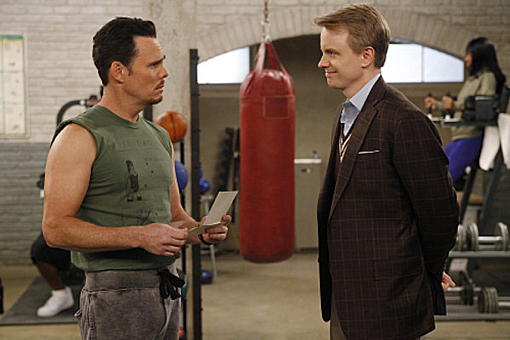By Zack Gutin · August 15, 2011

Every network upholds a different set of principles; from the types of scripted shows they try to win awards with to the talent competitions that bring them the heavy ratings to the stars they think will most excite viewers. They make a lot of decisions every Fall, choosing the scripted shows that they think will best appeal to audiences and, subsequently, advertisers. For audiences, though, there is going to be some confusion when they tune into CBS’s How To Be A Gentlemen. Given everything they know about the CBS brand of situation comedy – one that aims to capture audiences from 8 to 80, this series seems to be a move towards a new direction. But it comes up short. Stop now, turn back, this is not the way to go.
The hardest thing about predicting the success of a series is in understanding that the sensibilities of American families are ever-changing, now more diverse than ever before. What was once taboo for television is now welcome faire. As ease of access to more risqué content expands – thanks to the almighty Internet – the desensitization of once predictable audiences is altering what can keep people’s attention. At the risk of alienating more conservative family audiences, HTBAG seems like an attempt to tap this new-wave, less-than-couth lifestyle represented by Kevin Dillon’s character, while suggesting perspectives as to how it might be fixed. Cool cultural metaphor, right? For key young adult audiences, though, that is going to seem like hiring a bouncer to check IDs at a high school kegger. Buzz-kill.
The series revolves around a journalist and the last of the dying breed of chivalrous gentleman. His column, How To Be A Gentleman faces extinction when his magazine gets purchased and re-imagined by another company. Later, when the journalist arrives for his first day of personal training, he finds out that the high school jerk that used to give him dead-arms in the hallway now owns the gym. Sure enough, he greets him with a dead-arm. Double sure enough, he is going to be his trainer. Third sure enough, he’s just the type of guy this journalist’s new bosses want to appeal to (“…People who don’t read,” the character jokes, in possibly the best line of dialogue in the episode). Chances are you can probably guess what happens from here and therein is the problem with – at the very least – this pilot episode; perhaps the larger series will dig deeper. The characters try to fix one another, but of course our intelligent journalist suffers an ill fate at the hands of a social experiment set in motion by the dead-arm giving former high school nightmare. Why are they spending time together than? So the journalist can get better material? Riiiiiight.
I’m curious what the thinking was with the casting of Kevin Dillon for the dead-arm gym trainer. Perhaps they felt that the audience for HTBAG would have very little overlap with fans of HBO’s Entourage. This would make some sense to me, except that clearly he was signed to be a draw – hot off a hit cable series – knowing fans of the ending HBO series would follow him to CBS. But the characters are too tragically similar for it not to become a point of distraction for viewers; both are unsophisticated fitness freaks with a chip on their shoulder. Now he has resentment towards an overbearing father instead of his younger movie-star brother. It feels like we’re watching the sitcom spinoff for the Johnny Drama character, yet he’s still not the main character – how appropriate.
Most of the other supporting characters are too off-putting to help keep remotes on the coffee table. The one bright spot is our main character’s sister, played by the amazing Mary Lynn Rajskub. Then there is her husband, our main characters brother-in-law, who is too foolish to address his wife’s extra-marital interests. Hilariously played by the legendary Dave Foley, the lack of seriousness given to the sub-plot by the other characters takes the wind right out of his sails. It probably would have been better served in a later episode where some more focus could have been afforded to it. The journalist’s mother whose mind is slipping – forgive the pun – also seems to “lack focus.” Is it an ailment or is she just stupid? It just seems to come and go throughout one dinner scene. The audience needs to be better informed to help us understand the nature of the situation for each character, because in the future the audience will be expected to know X about a character in order for Y to be funny. Define this character’s flaw; let us in on the joke. Please.
I wonder what audiences will get in subsequent episodes. Pilots don’t always reflect the series as a whole, so let’s see what else they can do to better elevate the character parts. All in all, you’ve got some great cast here and a little more for them to work with might have a good pay-off. Define the characters, show why they make certain decisions, let us understand their limitations – and then throw funny situations at them. If you do it in any other order, we’re going to be trying to play catch up… and what happens to audiences when they feel like they’re lost or left behind? CLICK!